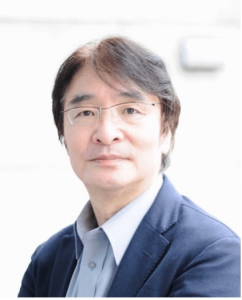#181– January 09, 2023

Symphonic Suite “Gaia” for Wind Orchestra by Japanese composer, conductor and arranger Masamichi (Masamicz) Amano is our Composition of the Week.
This very large scaler work was completed in 2008 to commemorate the 30th anniversary of the Hamamatsu Symphonic Wind Orchestra, who released it in 2020 for CAFUA records with conductor Tohru Asada, bringing the work to a wider audience.
The score is structured in four movements, titled in French in the album’s release.
- De la naissance de la Terre au commencement de civilisation du monde.
(From the birth of the Earth to the beginning of world civilization) - Le mouvement qui considère l’influence que l’humanité cause à l’environnement terrestre.
Développement de civilisation, guerre et effondrements.
(The movement that considers the influence that humanity causes to the earth environment. Development of civilization, war and collapses) - Le mouvement offert à toutes les victimes de la guerre dans l’Histoire de la Terre
(The movement offered to all victims of the war in the history of the Earth) - Finale (Finale)
The symphonic suite has a duration of over 50 minutes, and it is inspired on Gaia, which in Greek Mythology is the ancestral mother of all life.
The second movement has been published separately by Yamaha Music and it is available on rental. The author was not able to find more information about the publication of the whole work.
Amano graduated from Kunatchi Music University in 1980 with the first prize in composition and the Takeoka Award. Two years later, he again gained the top prize in composition when he finished graduate school at that university. Ever since his university days, he has been interested in classical, jazz, rock, folk, popular, and modern music.
After graduation, Amano went to Australia and became the first Japanese to master a computerized musical instrument (CMI). He went on to be one of the leaders of computer music in Japan. Amano has produced albums for many artists and music for movies, animations, videos, commercials, and television programs.
Amano has flourished in several foreign countries. He introduced Japanese music to Bolivia, arranged music written by the King of Thailand, and conducted and recorded his own works with the Polish National Philharmonic Orchestra in Warsaw. He has received commissions from the Warsaw String Quartet, Trio Classic, the Paderewski Museum (for the 1994 Paderewski Festival), a national competition in Munich (Germany) for a percussion piece, and a test piece for the Kuripinsky Composition, a national clarinet competition in Poland.
Amano has appeared on Japanese television programs, including MTV-Japan, and Concert Without Titles. He wrote and conducted a work for two flutes and orchestra that was commissioned by the Japanese television program Hit Studio at Night and performed on a program of light music.
Amano has performed his own works with percussionist Sumire Yoshihara at the Tokyo Music Festival. In addition to playing his own compositions at this festival’s world competition in 1983 and 1984, and being a special guest performer in 1988, Amano was the festival’s general music supervisor in 1989. In that same year, Amano worked as a composer, arranger, conductor, and supervisor of the theme song for Asia Pacific Junior Chamber of Commerce International’s Trans-Pacific summit meeting. It was played by the Kanagawa Philharmonic Orchestra in Yokohama Arena.
Amano has been a judge at the Kuripinsky national clarinet competition in Poland and at the All-Japan Band Competition. He created a sensation in the Japanese band world twenty years ago when he arranged the music of Akira Miyoshi, Akio Yashiro, and Toshiro Mayuzumi for that medium.
When his work Expiation was played by the band of Fujimura Girls Junior and Senior High School, it was awarded the Grand Prix and a commendatory award from the Ministry of Education at a wind ensemble competition in 1999. Four of his works were played at the All-Japan Amateur Band Music Competition (adult category) in 2000. Three of the four bands that played his music were awarded gold medals. He gained the top prize at the 23rd Japanese Academy Awards Ceremony in 2000 for his music for the film Omocha (Toys), directed by Kinji Fukusaku. One year later he again gained the top prize at that ceremony for his score to Battle Royal, also directed by Fukusaku. Furthermore, Amano was awarded an “Academy Award” at the 10th Japanese Band Music Organization presentations in the composition and arrangement category.
Amano’s compositional style is eclectic: traditional tonality, avant-garde, traditional Japanese elements, and pop songs. He has written music for, and performed with, many artists and groups in Japan and abroad, including the Polish National Philharmonic Orchestra, the London Philharmonic Orchestra, the Pomeranian Philharmonic Orchestra in Bydgoszcz, Poland, the Royal Symphonic Orchestra, the New York Chamber Orchestra, Les Soloistes de Versailles, the All-Japan Philharmonic Orchestra, the Tokyo Philharmonic Orchestra, the Warsaw String Quarter, the Warsaw Brass Ensemble, Neil Larsen, Stevie Wonder, the Perez Prado Orchestra, and a large number of Japanese artists.
Amano is a member of the Japanese Society for the Rights or Authors, Composers, and Publishers, the International Society for Contemporary Music, and the Japan Music and Dance Association.
Other works for wind ensemble include:
- Symphony No. 1 “Graal” (2007 – 2010)
- Symphonic Suite No.9 “The Aurora”
- Ten Rai Mu Bou (2013)
- Liberation (2020/22)


